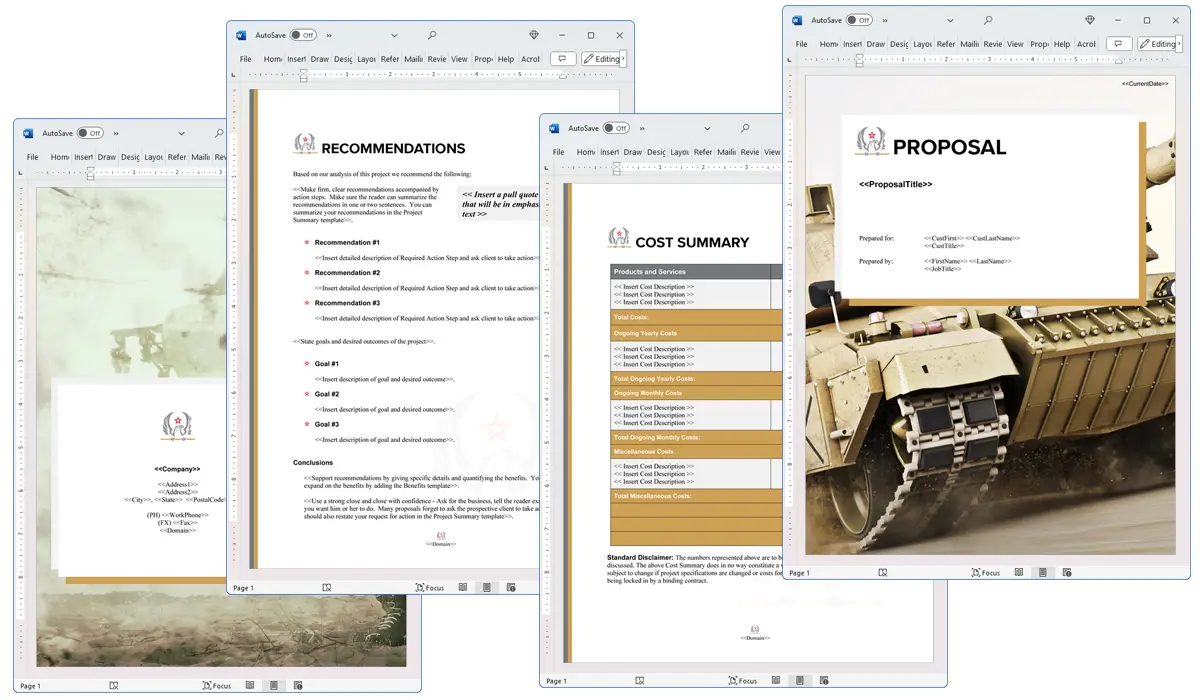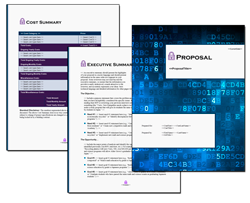What is the Research chapter used for?
Proposal Kit Professional Bundle adds more design themes, all six Contract Packs,
a project management library, and Expert Edition software.

Illustration of Proposal Pack Military #6
We include this Research chapter template in every Proposal Pack, along with thousands more. You assemble this chapter with others in various combinations to create custom-tailored business proposals, plans, reports, and other documents. Proposal Packs apply custom visual designs to the templates, giving the final documents a consistent professional finish.
 DOWNLOADABLE, ONE-TIME COST, NO SUBSCRIPTION FEES
DOWNLOADABLE, ONE-TIME COST, NO SUBSCRIPTION FEES
Overview of the Research Chapter
In the field of business proposals, the Research chapter serves a fundamental role. It is designed to detail the analysis and inquiry that has either been conducted or is slated for future investigation. This chapter is crucial as it informs the reader or potential stakeholders about the depth, scope, and direction of research that underpins the proposition. Whether part of a comprehensive research proposal, a feasibility study, or a market study, this chapter helps establish credibility and demonstrates due diligence.
How is the Research Chapter Used?
The Research chapter is used in various types of business proposals to showcase the analytical work that supports the proposal's objectives. It provides a structured way to present findings and discuss the relevance of the research to the project. For instance, in a business context, this might involve showing market trends, customer needs, or competitive analysis that justify the feasibility of a new project. It sets the stage for arguing the necessity and viability of the proposed solution.
What is Included in the Research Chapter?
Typically, the Research chapter includes several key elements:
- Introduction to the Research: This section outlines the questions that were asked or will be explored.
- Methods and Sources: Details about how the research was or will be conducted, including any specific methodologies and sources of data.
- Findings: A summary of the results obtained or expected outcomes.
- Analysis: Interpretation of the findings; how does the data collected influence the proposal?
- Implications: Discussion on how the research impacts the overall proposal and decision-making process.
Use Case Examples for the Research Chapter
- Market Analysis for a New Product Launch: Detailing consumer behavior and competitive context to justify the product's market entry.
- Feasibility Study for a Real Estate Development: Using demographic and economic data to assess project viability.
- Scientific Research for a Healthcare Solution: Presenting preliminary studies that support the efficacy of a new medical device.
- Environmental Impact Research for a Construction Project: Analyzing potential effects and compliance with regulations before project approval.
- Historical Data Analysis for Financial Services: Using past financial trends to predict future market behaviors in support of a new investment strategy.
Key Takeaways
- The Research chapter is important in proposals to outline and substantiate the research conducted or proposed.
- It enhances the credibility of the proposal by demonstrating thorough analysis and understanding of the subject matter.
- This chapter includes the purpose of the research, methodologies used, key findings, and their implications.
- The Research chapter is adaptable and can be tailored to different types of business proposals, whether for market studies, scientific inquiries, or feasibility assessments.
- Effective use of the Research chapter can significantly influence the outcomes of a proposal by providing a strong foundation of evidence and analysis.

Illustration of Proposal Pack Security #10
 What Our Clients Say
What Our Clients SayIt has been utter bliss saving tons of hours of trying to create proposals from scratch. The quality of proposals and other documents is absolutely top-notch, and I will genuinely recommend it to any serious business, looking for great quality and efficiency."
MSc., CISA, CISSP, CISM, CRISC, CDPO, ISO27k1LI, ISO27005 Risk Manager
 4.7 stars, based on 845 reviews
4.7 stars, based on 845 reviewsAlternate Chapters
Related Chapters
- Experiments
- Future Potential
- Feasibility Study
- Hypothesis
- Due Diligence
- Variables
- Validation
- Data
- Development
- Product Development
- Reverse Engineering
- Fieldwork
- Bias
- Controls
- Candidates
- Expedition
- Properties
- Laboratory
- Human Behavior
- Physics
- Call for Papers
- Detection
- Fluctuations
- Indicators
- Genetics
- Nanotechnology
- Machine Learning
- Tracing
- Fact Checking
Document Layouts Using the Research Chapter
- Extinction and Climate Change Study
- Research Assistant Proposal
- Medical Research Project Funding Proposal
- Research Funding Request Proposal
- Medical Clinic Project Proposal
- Feasibility Study and Analysis
- Museum Conservation Project Proposal
- PhD Thesis Proposal
- Investment Restructuring to Reduce Risk Proposal
- International Research and Development Project Proposal
- Research Expedition Grant Funding Request
- Research Proposal (Long)
- Feasibility Study Report

The Research chapter and other chapters are integrated into a Word document as illustrated here in the Proposal Pack Communication #4 design theme. There are hundreds of design themes available, and every design theme includes the Research chapter template.
A proper business proposal will include multiple chapters. This chapter is just one of many you can build into your proposal. We include the complete fill-in-the-blank template in our Proposal Pack template collections. We also include a library of sample proposals illustrating how companies in different industries, both large and small, have written proposals using our Proposal Packs. This template will show you how to write the Research.
We include a chapter library for you to build from based on your needs. All proposals are different and have different needs and goals. Pick the chapters from our collection and organize them as needed for your proposal.
Using the Proposal Pack template library, you can create any business proposal, report, study, plan, or document.
 Ian Lauder has been helping businesses write their proposals and contracts for two decades. Ian is the owner and founder of Proposal Kit, one of the original sources of business proposal and contract software products started in 1997.
Ian Lauder has been helping businesses write their proposals and contracts for two decades. Ian is the owner and founder of Proposal Kit, one of the original sources of business proposal and contract software products started in 1997.By Ian Lauder
 Published by Proposal Kit, Inc.
Published by Proposal Kit, Inc.


 Cart
Cart
 Facebook
Facebook YouTube
YouTube X
X Search Site
Search Site